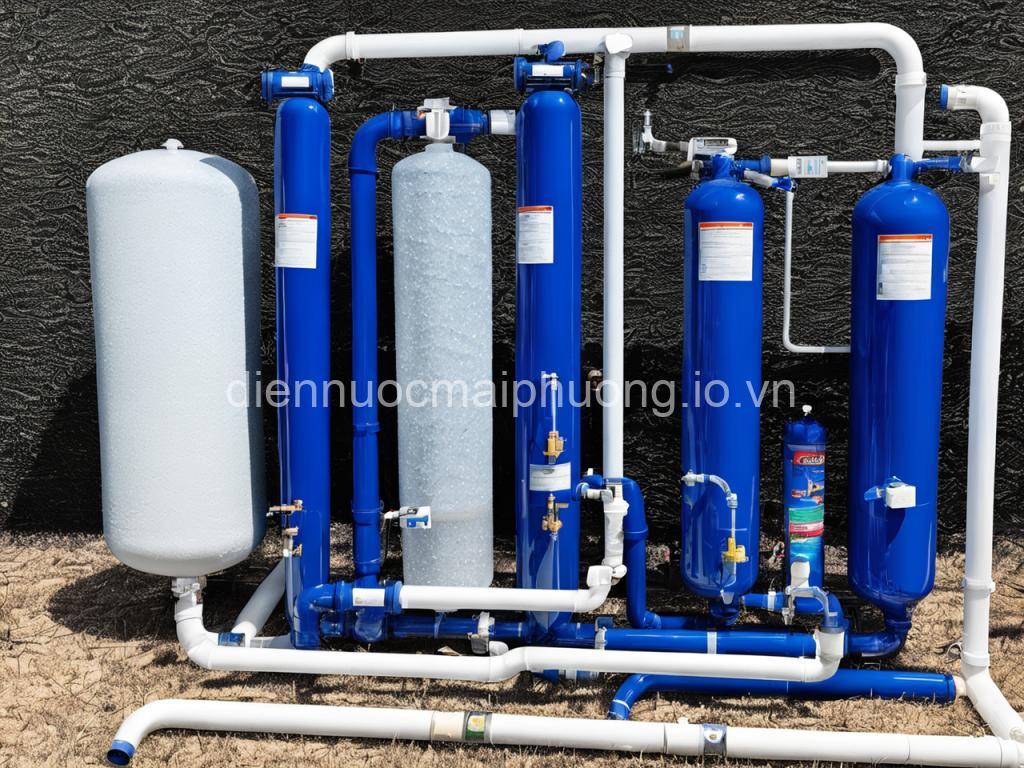Water knowledge
Maintaining Water Filtration Systems for Optimal Performance – diennuocmaiphuong.io.vn
Maintaining Water Filtration Systems for Optimal Performance – diennuocmaiphuong.io.vn. In today’s article, diennuocmaiphuong.io.vn will explore with you in the most detailed and complete way. See now!
How to Maintain Your Water Filtration System for Optimal Performance
A well-maintained water filtration system is essential for enjoying pure, fresh water and ensuring your system’s longevity. It’s all about understanding your system’s needs and following a regular maintenance routine. This involves understanding the components that work together to purify your water, knowing when to replace filters, and keeping the system clean.

Understanding Your Filtration System
Think of your water filtration system as a dedicated team working to remove impurities. Every component plays a crucial role in the process, and each has unique requirements. Let’s get to know the team:
Identify the Components
- Sediment Filter: The first line of defense, this filter traps larger particles like sand, dirt, and rust.
- Carbon Filter: A vital component for removing chlorine, odor, and taste from your water.
- Membrane Filter: This filter removes smaller particles, including bacteria, viruses, and cysts.
- UV Lamp: A powerful tool for killing bacteria and viruses by using ultraviolet light.
- Pre-filter: Protects other filters from clogging by trapping larger particles before they reach the main filters.
- Housing: The container that holds the filter cartridges and protects them from damage.
Consult Your System Manual
Every system is unique, and understanding your specific model is key. The manufacturer’s manual will provide detailed information about your system’s components, filter lifespans, maintenance schedules, and recommended cleaning procedures. This manual is your go-to guide for all things related to your system’s care.
Regular Filter Replacements
Just like any other essential tool, filters need to be replaced to ensure optimal performance. Imagine a clogged filter as a barrier to clean water – it’s hindering the system’s ability to do its job.
Filter Lifespan
Filter lifespan varies depending on the type of filter, water quality, and usage. But a general rule of thumb is to replace filters every 6 months. However, it’s essential to check your manufacturer’s recommendations for the specific lifespan of your filters.
Recognizing Filter Replacement Needs
Your system will signal when a filter change is needed. Pay attention to these signs:
- Decreased Water Flow: A significant decrease in water flow indicates a clogged filter.
- Noticeable Taste or Odor Changes: If you detect an unusual taste or smell in your water, it’s likely a worn-out filter.
- Discolored Water: Water that appears cloudy, brown, or rusty could indicate a filter that needs replacing.
Proper Filter Disposal
Always dispose of old filters responsibly. Don’t simply toss them in the trash. Check with your local waste management agency for proper disposal guidelines. It’s important to protect our environment and ensure filters are disposed of correctly.
Cleaning Your Water Filtration System
A clean system operates efficiently. Think of it like cleaning your home – regular maintenance keeps it functioning smoothly.
Cleaning Routine
The frequency of cleaning depends on your system type and water quality. For most systems, monthly or quarterly cleaning is recommended. But again, consult your system manual for specific instructions.
Cleaning Products
Use mild cleaning agents, such as vinegar or baking soda, to clean your system. Avoid harsh chemicals that could damage the components.
Flushing the System
Flushing your system helps remove sediment and debris that have accumulated over time. Here’s a simple process:
- Turn off the water supply to your system.
- Disconnect the filter cartridge.
- Run water through the system for several minutes until the water runs clear.
- Reconnect the filter cartridge.
- Turn the water supply back on.
Monitoring Water Pressure
Water pressure is an important indicator of your system’s health. Think of it as the system’s heartbeat – it tells you if everything is flowing smoothly.
Importance of Water Pressure
Maintaining proper water pressure ensures efficient system operation. Low pressure can hinder water flow and filter effectiveness. High pressure, on the other hand, can damage system components.
Checking Water Pressure
Use a water pressure gauge to check your water pressure. This gauge can be found at most hardware stores. To check pressure:
- Attach the gauge to an outdoor faucet.
- Turn the faucet on fully.
- Read the gauge to determine the water pressure.
Addressing Pressure Issues
If your water pressure is too low or too high, you may need to adjust the pressure regulator. Contact a qualified plumber for assistance with adjusting the regulator.
Identifying and Addressing Leaks
Leaks can lead to water damage, wasted water, and potential health risks. It’s important to address leaks promptly.
Signs of Leaks
Here are some signs of leaks in your water filtration system:
- Water dripping: Listen for any dripping sounds coming from your system.
- Dampness around the system: Check for dampness or moisture around the system’s components.
- Unusual sounds: Listen for any unusual noises, such as gurgling or hissing, which could indicate a leak.
Locating and Repairing Leaks
Identify the source of the leak by carefully inspecting the system components. You may need to tighten connections or replace faulty parts. If you can’t locate or repair the leak yourself, call a qualified plumber.
The Importance of Timely Repairs
Don’t ignore leaks. Ignoring leaks can lead to costly water damage and health risks.
Troubleshooting Common Issues
Every system can experience hiccups. Knowing how to troubleshoot common issues can save you time and money.
Reduced Water Flow
If you notice reduced water flow, here are some possible causes:
- Clogged Filter: Replace the filter cartridge.
- Sediment Build-up: Flush the system to remove accumulated sediment.
- Malfunctioning Pump: If you have a pump, check if it’s working correctly.
Unpleasant Taste or Odor
If you notice an unpleasant taste or odor in your water, it could be due to:
- Worn-out Filter: Replace the filter cartridge.
- Contaminated Water Source: Contact your local water utility to test the water quality.
- Mineral Buildup: Clean the system to remove mineral deposits.
Noisy Operation
Noises coming from your system can be caused by:
- Loose Components: Tighten any loose connections or fittings.
- Sediment Buildup: Flush the system to remove sediment buildup.
- Malfunctioning Pump: Check if the pump is working correctly.
Water Discoloration
Discolored water can be caused by:
- Rusty Pipes: Contact a plumber to address rusty pipes.
- Mineral Buildup: Clean the system to remove mineral deposits.
- Sediment: Flush the system to remove sediment buildup.
Professional Maintenance
While regular DIY maintenance is essential, professional inspection is crucial for ensuring your system’s optimal health. Think of it as a regular check-up for your system, guaranteeing it stays in tip-top shape.
Benefits of Professional Inspection
- Optimal Performance: Professionals ensure your system runs smoothly and effectively.
- Identifying Potential Issues: They can detect potential problems before they become major issues.
- Extending System Lifespan: Regular professional maintenance helps extend your system’s lifespan.
Frequency of Professional Maintenance
The frequency of professional inspections varies based on your system type, usage, and water quality. For most systems, a yearly inspection is recommended. However, consult a professional for specific guidelines tailored to your system.
Finding a Qualified Technician
When choosing a technician, ask for recommendations from friends, family, or neighbors. Verify the technician’s credentials and experience. Ensure they are licensed and insured.
Additional Tips for Maintaining a Water Filtration System
- Use High-Quality Filters: Invest in quality filters that meet your system’s requirements and water quality needs.
- Regular Water Quality Monitoring: Periodically test your water quality to ensure your system is effectively removing impurities.
- Cleanliness: Maintain a clean environment around your water filtration system to prevent contamination.
FAQs
How often should I replace my water filter cartridge?
The frequency of filter replacement depends on the type of filter, water quality, and usage. Check your manufacturer’s recommendations or consult with a professional for guidance. Generally, filters should be replaced every 6 months, but it’s essential to follow the specific instructions for your system.
What are the signs that my water filter needs to be replaced?
Several signs indicate a worn-out filter. These include:
- Reduced water flow: A noticeable decrease in water flow suggests a clogged filter.
- Changes in taste or odor: Unpleasant taste or odor in your water often indicates a filter that needs replacement.
- Discolored water: Cloudy, brown, or rusty water usually signals a worn-out filter.
How do I clean my water filtration system?
Cleaning your water filtration system is essential for optimal performance. Here are some general cleaning procedures:
- Disconnect the filter cartridge: Remove the filter cartridge from the system.
- Flush the system: Run water through the system for several minutes to remove sediment and debris.
- Clean the housing: Use a mild cleaning agent, like vinegar or baking soda, to clean the system housing.
- Reconnect the filter cartridge: Once the housing is clean, reconnect the filter cartridge.
- Turn on the water supply: Turn the water supply back on and allow the system to run for a few minutes.
What is the ideal water pressure for a water filtration system?
The ideal water pressure for a water filtration system varies depending on the system’s design and components. However, a general guideline is to maintain a pressure between 40-60 PSI. Low pressure can hinder water flow and filter effectiveness, while high pressure can damage system components. If you suspect your water pressure is too low or too high, consult a qualified plumber to adjust the pressure regulator.
Can I fix leaks in my water filtration system myself?
Some minor leaks can be fixed with simple DIY repairs, such as tightening connections or replacing faulty parts. However, if you can’t locate or repair the leak yourself, it’s always best to call a qualified plumber for professional assistance. Ignoring leaks can lead to water damage and potential health risks.
Conclusion
Maintaining a water filtration system ensures you enjoy pure, fresh water and protect your investment. By understanding your system’s components, following regular maintenance schedules, and addressing issues promptly, you can keep your water filtration system functioning optimally. Remember to consult your system’s manual for specific guidelines and always seek professional assistance when needed.
For more information on water filtration systems and other electrical and plumbing products, visit diennuocmaiphuong.io.vn! Share your questions and experiences in the comments below!
